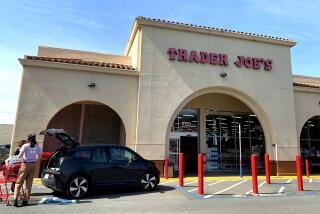Workers Angry Over Big Stock Losses : Benefits: Thousands of employees contributed to a company-sponsored savings plan invested solely in shares that have fallen to less than $2 each.
- Share via
The offer from his employer four years ago seemed like a sweet deal and one that would help Stephen J. Mack through postgraduate school. Today, it is an offer that Mack, who is $1,700 poorer, wishes he had never heard of.
“This is a significant blow and I feel like I was misled,” said Mack, who had invested more than $3,700 in the employee savings plan at his former employer, Carter Hawley Hale, which owns the Broadway department store. “The debts I had intended to pay off, I can no longer pay off and my other savings will be exhausted.”
Mack was one of 14,000 Carter Hawley workers who contributed to an employeesavings plan that was promoted as a way to support the company and invest in their future. Instead of offering comfort and security, the plan--invested entirely in company stock--has turned into a nightmare for employees. They have watched the value of their holdings plunge with the fortunes of Carter Hawley, which filed for Chapter 11 bankruptcy protection Monday.
Although the plan offered workers a way to build savings and reduce income taxes, it also served as a takeover deterrent for Carter Hawley, which fought off two unwanted takeovers during the 1980s and could count on loyal employees for support.
“I thought it was a way to support my company,” said a San Diego Broadway employee who contributed $2,000 to the plan. “The people who did get into it are pretty much committed (to the company). I never had any idea that I would lose my money.”
The stock’s fall from $14 a share in 1989 to less than $2 is an especially severe burden for older employees who expected the savings plan to supplement their retirement income. “A lot of people are postponing their retirement because of that,” said Bill Fiore, president of Local 1100 of the Department Store Employees Union, which represents nearly 900 employees at Emporium Capwell stores in Northern California.
Unlike most 401k savings plans, the Carter Hawley program did not give workers a choice among various investments, such as a stock, bond or money market funds. Nearly 95% of the employee savings plans give workers a choice of investments, according to a survey of major U.S. employers by Hewitt Associates, a benefits consulting firm.
Most savings plans offer choices “to avoid a situation like this where you have all your eggs in one basket,” said one Los Angeles employee benefits lawyer.
Carter Hawley’s contributions to the plan also fell below industry averages, according to benefits experts. While most employers add 50 cents to their employee savings plan for every $1 in employee contributions, Carter Hawley puts in only 25 cents
As a result of the plan’s investment in only Carter Hawley shares, employees face the same amount of risk as do other stockholders, said San Francisco attorney Barry Homer, who specializes in employee benefits. “There is no special protection for them,” he said. “They are in the same boat as every other shareholder. Anybody else who the company owes money comes before you.”
The value of the savings plan “depends on where the stock price emerges after the bankruptcy proceedings,” said Jennifer Davis, a research analyst with the Employee Benefit Research Institute, a nonprofit organization based in Washington.
Many employees said they did not comprehend the risks attached to Carter Hawley’s one-stock savings plan. “I never played around with stocks and never really understood it--that was foolish on my part,” said one Broadway salesman who estimated his $2,000 in contributions are now worth less than $500. “They really pushed it as a good investment. I thought it would be a good way to save. It turned out not to be.”
Many employees were counting on another takeover attempt to boost the sagging stock price, whose daily movements were posted prominently on store bulletin boards. “They don’t want to cash out,” said Fiore, who has about $7,000 invested in the plan. “Everybody has those buyout dreams. They thought (the stock would) go straight through the roof.”
Although workers owned a substantial portion of the company, many felt they were never permitted to exercise any control. “I always liked the idea of of companies that are employee-owned,” said Mack, who left Carter Hawley in October. But “the participants in the plan didn’t feel like participants in the company. They allowed you to share the risk but squirreled away the power.”
RELATED STORIES, A1, D5, D7
Carter Hawley Hale Share Prices Price per share, weekly close except latest Monday close: $1.625, down 25 cents
More to Read
Inside the business of entertainment
The Wide Shot brings you news, analysis and insights on everything from streaming wars to production — and what it all means for the future.
You may occasionally receive promotional content from the Los Angeles Times.










